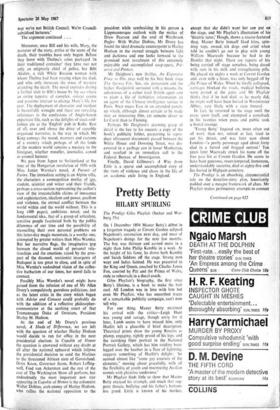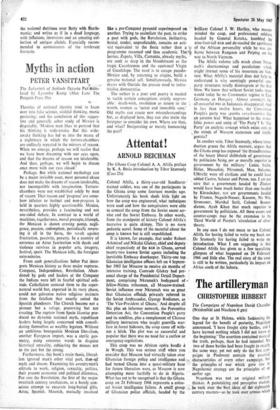Pretty Betty
HILARY SPURLING
On 1 December 1804 Master Betty's debut in a forgotten tragedy at Covent Garden eclipsed Napoleon's coronation next day, and most of Napoleon's doings for the next few months. The boy was thirteen and earned more in a night than John Philip Kemble in a week. At the height of his fame, he drove both Kemble and Sarah Siddons off the stage. Strong men wept and ladies fainted. He was presented to the King and Queen, coached by Charles James Fox, courted by Pitt and the Prince of Wales, rode to rehearsals in a ducal coach.
Giles Playfair's biography, the first since Betty's lifetime, is a book to make the hair curl. All London was in love with him but even Mr Playfair, who has unearthed traces of a remarkable publicity campaign, can't now tell why.
For one thing, Master Betty mistimed his arrival with the critics—Leigh Hunt was young and savage, though sorry for it later, Lamb seems to have missed him, only Hazlitt left a plausible if brief description. Theatrical prints show the young Roscius as plump, engaging, rightly proud of his legs; and the ravishing Opie portrait in the National Portrait Gallery, which has him striding bare- legged over the heather in a flare of lightning, suggests something of Hazlitt's delight: 'he seemed almost like "some gay creature of the elements," moving about gracefully, with all the flexibility of youth and murmuring Aeolian sounds with plaintive tenderness.'
Mr Playfair finds little to show that Master Betty enjoyed his triumph, and much that sug- gests threats, bullying and his father's bottom- less greed. Little is known of his mother, except that she didn't want her son put on the stage, and Mr Playfair's illustration of his
'theatric tutor,' Hough, shows a coarse-featured thug. Master Betty himself liked kites, spin- ning tops, owned, ten dogs and cried when told he couldn't go out to play with young William Macready because he had to do Hamlet that night. There are reports of his being carried off stage senseless, being dosed with rum in his milk and strengthening pills. He played six nights a week at Covent Garden and, even with a fever, was only begged off by a the Prince of Wales. When he finally collapsed, carriages blocked the roads, medical bulletins were posted at the gates and Mr Playfair thinks that if he had died, as he nearly did, he might well have been buried in Westminster Abbey very likely with a state funeral.
In fact, he returned to the stage until the craze spent itself, and attempted a comeback in his twenties when press and public took a brutal revenge.
'Young Betty' lingered on, more often out of work than not, retired at last, tried to cut his throat, and was later seen about London—'a portly personage aged about forty clad in a furred and frogged surtout.' Ten years later Macready struck his name off the free pass list at Covent Garden. He seems to have been generous, sweet-tempered, humorous, understandably secretive, died at eighty-five and lies buried in Highgate cemetery.
The Prodigy is an absorbing, circumstantial tale on the detective-story plan, luxuriantly padded over a meagre framework of clues. Mr Playfair makes perfunctory attempts to connect
Continued on page 622 the national dottiness over Betty with Beatle- mania; and writes as if in a dead language, with inflations, inversions and an amazing col- lection of antique clichés. Especially recom- mended to connoisseurs of the irrelevant footnote.



































 Previous page
Previous page